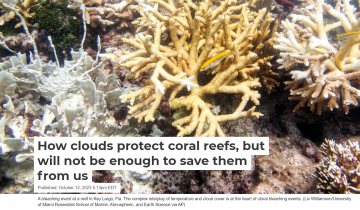Issues to watch out for at COP 28
UBC experts held a panel discussion on COP 28 on Nov. 21. Organizer professor Dr. Simon Donner was quoted.
Explainer | Why snake soup, the Hong Kong winter food that featured on a Pizza Hut pizza, has traditionally been eaten – and why it’s becoming harder to find
Snake soup is rich with a history in Chinese medicine, cultural, and health beliefs. “If farmed ethically and properly, I would imagine snakes take up less space, emit less greenhouse gases, and are perhaps even healthier to eat than cattle or pork, perhaps a stronger emphasis on ensuring snake meat is sourced responsibly could prolong or revitalise the tradition.” says postdoctoral researcher Dr. Félix Landry Yuan who is featured in South China Morning Post for his opinion and research regarding this topic
A UBC PROFESSOR EXPLAINS WHAT TO LOOK FOR AT COP 28 & WHY HE DOES NOT BELIEVE IN OVERSHOOT
“The point is about consumption and the best data I can point you for that was in this year’s UN Emissions Gap Report.” – Dr. Simon Donner is featured in Cortes Currents for his explanation on how we can have the population we do on the planet without consuming as much and without consuming it in the same way.
The fridge hack that can slack your food waste
Professor Dr. Jiaying Zhao discussed how to organize your fridge to reduce food waste and greenhouse gas emissions in the Washington Post via The Seattle Times
Photo by Kenny Eliason via unsplash
What is 6PPD and why is it killing our coho?
A study by Dr. Timothy Rodgers and Dr. Amanda Giang which found that rain gardens could help prevent a toxic tire chemical from entering our waterways is featured by multiple media outlets.
Scientists Flag Conflicts of Interest Ahead of UN Plastic and Chemical Talks
An international group of 35 scientists, including IRES’s Gunilla Öberg, is calling out conflicts of interest plaguing global plastic treaty negotiations and that have interfered with timely action on other health and environmental issues. They urge the implementation of strict guidelines to prevent the same problems from affecting the UN’s upcoming Science Policy Panel on chemicals.
Cigarette butts remain Vancouver’s most littered item — and a seemingly unsolvable waste problem
Cigarette butts are still the No. 1 most littered item in Vancouver. Education, mitigation programs over the threat of up to $10,000 in fines — have done little to this littering problem. Dr. Jiaying Zhao is featured in this CBC article to answer what can be done about this problem through social nudges.
New report on urban bats in Vancouver from grad student Daniel Forrest and alum Julia Craig
With funding from UBC’s Ocean Leaders program and the City, Forrest and Craig used bats as an exemplary group to identify existing supportive ecosystems (bat “hotspots”), areas that could or currently connect those ecosystems, and interventions which might help contribute to both.
2023 on track to be the hottest year as September smashes records | CNN
Dr. Simon Donner is featured by CNN for discussing data that showed September 2023 was the hottest ever recorded. He states that it’s imperative that in order to fight climate change, our world’s leaders must follow the Paris Agreement and understand the realities of a 3 degree increase instead of 2 degrees.
How clouds protect coral reefs, but will not be enough to save them from us
Dr. Simon Donner co-authored an op-ed about the importance of coral reefs and the danger they face from climate change.









